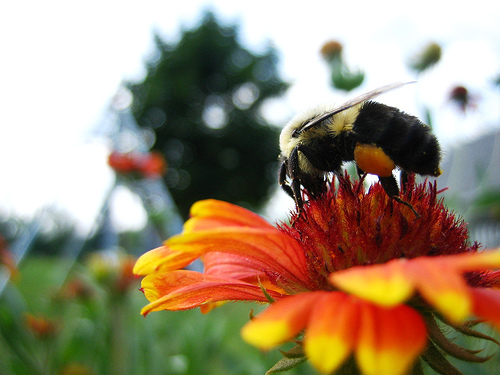
by Jean Lam
Honey is a sweet natural food made by bees. The most common type of honey collected by beekeepers for human consumption is the one produced by the honey bees in the genus Apis.
One of the reasons I simply love honey is due to its great taste. I also like using honey because of its versatility and amazing health benefits. Sugar on the other hand simply has empty calories and does not provide any benefits for your health.
Since honey products can be contaminated, it is best to buy raw honey at a local farmer’s market. If you are not careful, you may be simply buying sugary syrup instead of honey at a grocery store.
Versatility of Honey
Honey can be used as a replacement of sugar in your morning tea or green tea. It can be used in your morning oatmeal, sugar-free yogurt or whey protein shakes.
You can also make your own honey energy drink. Sometimes when I am thirsty and want a quick surge of energy, I have a glass of natural honey drink instead of a carbonated or energy drink. Just mix 1 tablespoon of honey in a glass of water with a few ice cubes to get a nice refreshing drink. You can also add some lemon, citrus or lime juice for added taste.
Health Benefits of Honey
Strengthens Immune System
Honey boosts your immune system and helps prevent cold and flu. It also helps prevent and cure sore throats and inflammation in the respiratory tract.
Reduces Infection and Helps Wound Heal Faster
Due to its healing, antiseptic and antimicrobial properties, honey is effective for reducing infection, swelling and pain. So it can be used externally for skin afflictions such as cuts, burns, bruises, wounds, scars and even acne.
In addition, it can treat other ailments like yeast infection, athlete foot and arthritis pain. It’s believed that Manuka honey is best used for external ailments as it’s the favorite honey for wounds.
Helps You Stay Full Longer
Honey has natural appetite suppressant properties. Hence it can keep hunger pangs at bay and fight obesity.
Other Benefits
Honey can be used to treat hangovers, fight insomnia and aid digestion. Raw honey also has antioxidants and phytonutrients which can potentially prevent cancer.
Raw honey as a sweetener is all natural and does not contain any artificial additives. It is healthier than table sugar, splenda (sucralose), saccharine, acesulfame potassium and aspartame (Nutrasweet) by far.
Some of these sweeteners are used regularly for consumption but there is so much conflicting health-related information about them that long-term use is becoming questionable.
Honey vs. Table Sugar
I prefer honey over table sugar for a few reasons. Let’s make a comparison.
Both contain sucrose which is made up of approximately half glucose and half fructose. Glucose also known as dextrose is a monosaccharide sugar and the primary source of energy for our body. It’s a simple sugar and a fast-digesting carbohydrate.
Many times you hear people in the gym talking about having glucose post-workout. The reason is glucose is quickly used as energy and can replenish lost glycogen stores(energy storage cells) fast.
On the other hand, fructose is also a simple monosaccharide but it digests slowly and can provide a sustained release of energy. The downside with fructose is it’s metabolized only by the liver. So excessive consumption of fructose can cause undue stress on the liver, potentially resulting in fatty liver disease, high uric acid, high blood pressure and an increase in bad cholesterol levels(LDL). This can occur primarily due to high fructose intake.
The difference between honey and table sugar is that glucose and fructose in the latter are bonded together whereas in the former, they are separated in individual units. To be able to use the energy found in table sugar, our stomach has to use its own enzymes to break the molecules apart.
This is not the case for honey as the nectar has a special enzyme which already divides the sucrose into glucose and fructose, hence making energy consumption faster.
Raw honey has a healthier Glycemic Index(GI) ranging from 32-69 whereas granulated table sugar ranges from 58-65.
Calorie-wise, 1 tablespoon of honey yields 64 calories whereas 1 tablespoon of table sugar yields 46 calories. Although honey has more calories, it’s more nutrient-dense and it’s sweeter; hence you don’t need to consume as much. Honey has several vitamins and minerals such as vitamin B6, riboflavin, pantothenic acid, thiamin, niacin, certain amino acids, iron, manganese, magnesium, phosphorus, potassium, calcium and zinc. As for table sugar, it has mostly “empty calories”. This basically means that sugar doesn’t have much nutritional value.
Can Diabetics Consume Honey?
For diabetics, it’s recommended to use honey moderately because the last thing you would like to do is spike your insulin levels. And as with everything in life, excess is never good.
1 tablespoon of honey has 17 grams of carbohydrates, 8.1 grams of fructose and it’s not advised to exceed 50 grams of fructose per day as this can raise your blood sugar levels.
If you eat natural unprocessed honey cautiously within your daily caloric and carbohydrates requirements, you should not worry. Generally diabetics should consume between 30-50 grams of carbohydrates per meal.
So if you are looking for a healthier alternative to sugar, try raw honey from your local farmer’s market.
(Jean Lam has a passion for health and fitness and enjoys writing articles on muscle-building, nutrition and on effective ways to lose weight quickly for a healthier body.)





I’d like to add that anyone taking in any amount of any sugar (especially fructose) should also include a good amount of fiber in their diet. That’s why things like grinded fruits are better as sweeteners than pure sugars like table sugar or honey; you retain the fiber, which fights the blood sugar-raising effects of all sugars, and the liver dangers mentioned in this article from fructose.
Still, raw honey does have a surprising amount of nutrients and works as a salve as you say. So, thanks for the fine post!